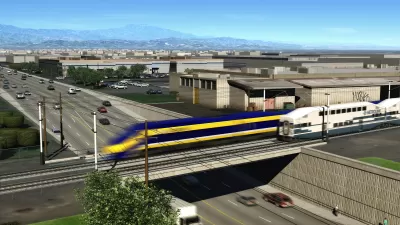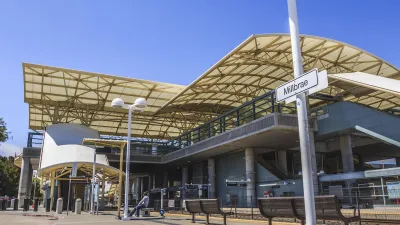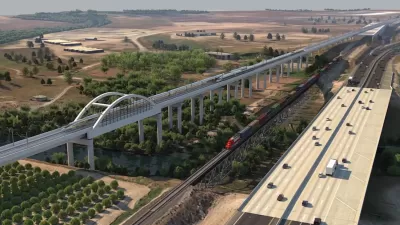Voters approved a $9.9 billion bond for the California High Speed Rail project in 2008. State legislators would like that money to be spent in other ways in 2021.

A showdown between Democratic state legislators and the Democratic governor of California could lead to layoffs and delays for the California High Speed Rail project in 2022.
"Top Democrats withheld billions of dollars in funding Gov. Gavin Newsom sought for the state’s high-speed rail line in the final days of this year’s legislative session, threatening construction delays and layoffs unless they come to a deal in early 2022," reports David Lightman. The state budget adopted at the end of the year's legislative session culminates a debate covered by Planetizen earlier this summer.
According to Lightman, Governor Newsom requested $4.2 billion, the total left from $9.9 billion in bond funding approved by voters in 2008, but "Assembly Speaker Anthony Rendon and other Democrats have argued for directing the money to other urban transportation projects."
State officials say that project can proceed without the funding—"At the end of last week, there were 866 daily workers on the [California High Speed Rail Authority’s] 35 active construction sites in the Central Valley"—but that work will have to slow by mid-2022 without a fresh infusion of cash.
Two other sources of funding could soon be delivered to the project—state money from cap-and-trade auctions, which resulted in $643.3 million for the project already this year, and money from the Infrastructure Investment and Jobs Act, which has yet to be voted into law by Congress.
Update: Joe Linton writes an article providing context on, and critiquing, Speaker Rendon and Assemblymember Laura Friedman's (D-Burbank) opposition to the project, as manifested this week with the state budget news reported above.
FULL STORY: Layoffs and delays threaten California’s high-speed rail as project faces funding hang up

Planetizen Federal Action Tracker
A weekly monitor of how Trump’s orders and actions are impacting planners and planning in America.

Maui's Vacation Rental Debate Turns Ugly
Verbal attacks, misinformation campaigns and fistfights plague a high-stakes debate to convert thousands of vacation rentals into long-term housing.

Restaurant Patios Were a Pandemic Win — Why Were They so Hard to Keep?
Social distancing requirements and changes in travel patterns prompted cities to pilot new uses for street and sidewalk space. Then it got complicated.

In California Battle of Housing vs. Environment, Housing Just Won
A new state law significantly limits the power of CEQA, an environmental review law that served as a powerful tool for blocking new development.

Boulder Eliminates Parking Minimums Citywide
Officials estimate the cost of building a single underground parking space at up to $100,000.

Orange County, Florida Adopts Largest US “Sprawl Repair” Code
The ‘Orange Code’ seeks to rectify decades of sprawl-inducing, car-oriented development.
Urban Design for Planners 1: Software Tools
This six-course series explores essential urban design concepts using open source software and equips planners with the tools they need to participate fully in the urban design process.
Planning for Universal Design
Learn the tools for implementing Universal Design in planning regulations.
Heyer Gruel & Associates PA
JM Goldson LLC
Custer County Colorado
City of Camden Redevelopment Agency
City of Astoria
Transportation Research & Education Center (TREC) at Portland State University
Jefferson Parish Government
Camden Redevelopment Agency
City of Claremont





























